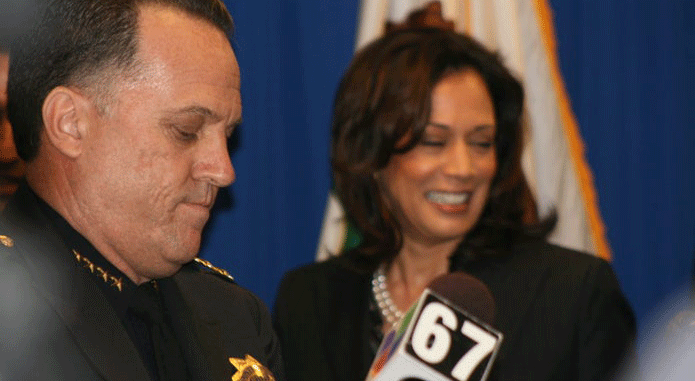On Friday, June 19, as activists took to the streets for Juneteenth protests to demand racial justice, a former Santa Cruz law enforcement leader weighed in with a different view.
That evening, former Santa Cruz Police Chief Kevin Vogel announced on his Facebook page that he was cancelling his Netflix subscription. Vogel’s post garnered attention because of the reason that he not-so-subtly hinted was behind the cancellation.
Vogel, who retired as chief in 2017, wrote that $120 million was “a lot of money for a charity that I am not interested in donating to.” Although Vogel did not elaborate to provide specific context, Netflix CEO Reed Hastings announced two days prior, on June 17, that he was personally donating $120 million to historically Black colleges.
“Thanks anyway, Reed Hastings,” Vogel added. “I’ll find other entertainment options.”
Some of Vogel’s Facebook friends cheered him on. Others, including journalist Brad Kava and Santa Cruz County Zero Waste Program Manager Tim Goncharoff, pushed back. “Don’t worry, the rest of us will make up for you,” Goncharoff wrote back.

Kava and others asked Vogel in the comments if he opposed Black colleges. Although Vogel was generally active in the comment section, he did not answer those questions.
Kava tells GT that, until coming across the Facebook post, which garnered 53 comments, he had always held Vogel in high esteem.
“I’ve covered cops in Florida and Kansas City and San Jose and Santa Cruz. And up until this point, I thought he was one of the best cops and one of the best chiefs, and I thought Kevin did a great job,” says Kava, a former GT contributor, who owns the local newspaper Growing Up in Santa Cruz. “I was shocked to see this.”
GT shared a screenshot of the online discussion with Brenda Griffin, president of the NAACP’s Santa Cruz chapter, who says the post is an example of how much work Americans still have to do when it comes to rooting out implicit bias from the nation’s institutions.
“That bias has no place in law enforcement,” she says.
In the post’s comments, at least one of Vogel’s friends said that supporting the educational careers of Black students was an example of reverse racism. The man implied that Hastings and his supporters were dividing the country and making racism worse.
Despite many racial barriers coming down over the past six decades, however, opportunity gaps persist across the United States. Black people still have a higher unemployment rate than whites do, they continue to face job discrimination, and, all the while, they make less money than whites on average.
Additionally, the country’s current racial wealth gap—a gulf that can be traced back to federally sponsored housing discrimination of the 1930s, if not much, much further—is wide, and it is growing. As of 2016, the median white household’s wealth (their savings and assets, minus their debt) was $171,000—nine times greater than that of the typical Black family, which had a median wealth of $17,600.
Not only that, but the gap is much bigger than most Americans realize. A 2019 study, published in Perspectives on Psychological Science, reported that Americans underestimate the size of the racial wealth gap by 80%.
Also in the comment thread below Vogel’s post, some of his friends weighed in to discuss Hastings’ position on police issues.
Vogel, who did not reply to GT’s Facebook messages seeking comment, wrote in the comments that, although he does not believe Hastings is “hostile to law enforcement,” he personally disliked a prior announcement from Hastings—a Santa Cruz resident—about donating $1 million to a data-based research organization dedicated to fighting racial bias in American law enforcement.
The racially charged comments come at an interesting time for Vogel’s legacy and for the state of policing more broadly. The U.S. is in the midst of a nationwide discussion about bias in law enforcement.
In Santa Cruz, the city is in the process of moving on from a predictive policing algorithm that was instituted during Vogel’s tenure and which has faced allegations of racial bias. On Tuesday, June, 23, a few days after Vogel drafted the Facebook post, the Santa Cruz City Council voted unanimously to eliminate predictive policing from the city, to preemptively ban facial recognition technologies and also to establish two new groups to study issues around race and law enforcement.
The council additionally voted to install a new Black Lives Matter mural and to display Pan-African and Black Lives Matter flags in the front of City Hall during the month of July every year.














Why is his comment described as “weird”? This is very clear. It’s racist.
Here is a revised headline:
“Former Santa Cruz Police Chief Takes Stance Against Black Colleges and Against Philanthropy Dedicated to Fighting Racial Bias in Law Enforcement”
“weird” is putting it nicely, GT. I’m with Randall.
I agree , let’s call it what it is and stop trying to sugar coat the disgusting truth that is racial biasness
Not Weird. Racist. Please correct your headline.
You can just say racist… instead of “weird” or “racially charged”. When you use a euphemism and fail to call it racist you’re legitimizing what he said and watering down the impact of the article.
Also shouldnt someone look into his arrest record? I mean, since he’s a racist? I wonder how many people of color this racist is responsible for incarcerating.